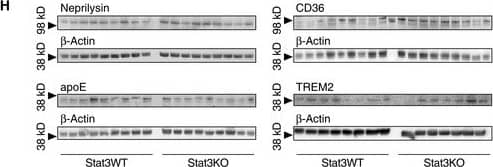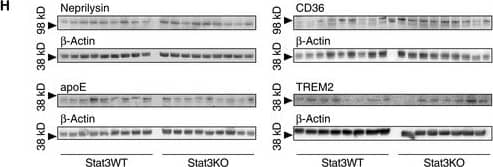Mouse Neprilysin/CD10 Antibody Summary
Tyr52-Trp750
Accession # AAA37386
Applications
Mouse Neprilysin/CD10 Sandwich Immunoassay
Please Note: Optimal dilutions should be determined by each laboratory for each application. General Protocols are available in the Technical Information section on our website.
Scientific Data
 View Larger
View Larger
Neprilysin/CD10 in Mouse Brain. Neprilysin/CD10 was detected in perfusion fixed frozen sections of mouse brain (glial cell in hippocampus) using 15 µg/mL Goat Anti-Mouse Neprilysin/CD10 Antigen Affinity-purified Polyclonal Antibody (Catalog # AF1126) overnight at 4 °C. Tissue was stained (red) and counterstained (green). View our protocol for Fluorescent IHC Staining of Frozen Tissue Sections.
 View Larger
View Larger
Detection of Mouse Neprilysin/CD10 by Western Blot Astrocyte‐specific Stat3 deletion increases microglial A beta internalization and degradation, and reduces apoE expression, dystrophic neurites, and detrimental cytokinesAInternalization of A beta (stained with IC16 antibody or methoxy‐XO4) was assessed using an engulfment assay, in which glial and A beta structures were surface‐rendered and A beta volumes co‐localized with glial volumes were quantified. Scale bars, 10 μm.B, CMicroglia (left Y axes) from APP/PS1 mice internalized significantly more A beta positive for IC16 or methoxy‐XO4 when Stat3 was deleted in astrocytes (*P < 0.05, Mann–Whitney test), whereas no changes were seen in astrocytes (right axes; APP/PS1‐Stat3WT, n = 8 (four females and four males) mice; APP/PS1‐Stat3KO, n = 11 (five females and six males) mice; age, 11 months; Mann–Whitney test).D–H(D–F) Western blot quantification of protein levels of the A beta ‐degrading enzymes neprilysin/CD10 and CD36, as well as the A beta ‐binding apolipoprotein E (apoE), revealed a significantly increased expression of neprilysin and CD36 and a decreased expression of apoE (APP/PS1‐Stat3WT, n = 9 (five females and four males) mice; APP/PS1‐Stat3KO, n = 9 (five females and four males) mice; age, 11 months; *P < 0.05, Mann–Whitney test for all comparisons). (G) In contrast, TREM2 expression remained unchanged (APP/PS1‐Stat3WT, n = 8 (four females and four males) mice; APP/PS1‐Stat3KO, n = 7 (four females and three males) mice; age, 11 months; Mann–Whitney test). (H) Western blots for proteins analyzed in (D‐G).Data information: Data are represented as mean ± SEM.Source data are available online for this figure. Image collected and cropped by CiteAb from the following open publication (https://pubmed.ncbi.nlm.nih.gov/30617153), licensed under a CC-BY license. Not internally tested by R&D Systems.
 View Larger
View Larger
Detection of Mouse Neprilysin/CD10 by Western Blot Astrocyte‐specific Stat3 deletion increases microglial A beta internalization and degradation, and reduces apoE expression, dystrophic neurites, and detrimental cytokinesAInternalization of A beta (stained with IC16 antibody or methoxy‐XO4) was assessed using an engulfment assay, in which glial and A beta structures were surface‐rendered and A beta volumes co‐localized with glial volumes were quantified. Scale bars, 10 μm.B, CMicroglia (left Y axes) from APP/PS1 mice internalized significantly more A beta positive for IC16 or methoxy‐XO4 when Stat3 was deleted in astrocytes (*P < 0.05, Mann–Whitney test), whereas no changes were seen in astrocytes (right axes; APP/PS1‐Stat3WT, n = 8 (four females and four males) mice; APP/PS1‐Stat3KO, n = 11 (five females and six males) mice; age, 11 months; Mann–Whitney test).D–H(D–F) Western blot quantification of protein levels of the A beta ‐degrading enzymes neprilysin/CD10 and CD36, as well as the A beta ‐binding apolipoprotein E (apoE), revealed a significantly increased expression of neprilysin and CD36 and a decreased expression of apoE (APP/PS1‐Stat3WT, n = 9 (five females and four males) mice; APP/PS1‐Stat3KO, n = 9 (five females and four males) mice; age, 11 months; *P < 0.05, Mann–Whitney test for all comparisons). (G) In contrast, TREM2 expression remained unchanged (APP/PS1‐Stat3WT, n = 8 (four females and four males) mice; APP/PS1‐Stat3KO, n = 7 (four females and three males) mice; age, 11 months; Mann–Whitney test). (H) Western blots for proteins analyzed in (D‐G).Data information: Data are represented as mean ± SEM.Source data are available online for this figure. Image collected and cropped by CiteAb from the following open publication (https://pubmed.ncbi.nlm.nih.gov/30617153), licensed under a CC-BY license. Not internally tested by R&D Systems.
Reconstitution Calculator
Preparation and Storage
- 12 months from date of receipt, -20 to -70 °C as supplied.
- 1 month, 2 to 8 °C under sterile conditions after reconstitution.
- 6 months, -20 to -70 °C under sterile conditions after reconstitution.
Background: Neprilysin/CD10
Neprilysin (NEP, neutral endopeptidase 24.11, EC 3.4.24.11) is a zinc metallopeptidase expressed at the cell surface of a variety of cells. The enzyme functions both as an endopeptidase with a thermolysin-like specificity and as a dipeptidylcarboxypeptidase. NEP has been shown to be involved in the degradation of enkephalins in the mammalian brain and the inactivation of circulating atrial natriuretic peptide (1, 2). NEP has also been identified as the common acute lymphoblastic leukemia antigen (CALLA), and to be expressed on the surface of lymphocytes in some disease states (3). These and other observations have resulted in considerable clinical interest in NEP as a potential target for analgesics and antihypertensive drugs. NEP is also a major degrading enzyme of amyloid beta peptide (A beta ) in the brain, indicating that down-regulation of NEP activity, which could be caused by aging, can contribute to the development of Alzheimer’s disease by promoting A beta accumulation (4).
- Malfroy, B. et al. (1978) Nature 276:523.
- Kenny, A.J. and S.L. Stephenson (1988) FEBS Lett. 232:1.
- LeTarte, M. et al. (1988) J. Exp. Med. 168:1247.
- Itwata, N. et al. (2001) Science 292:1550.
Product Datasheets
Citations for Mouse Neprilysin/CD10 Antibody
R&D Systems personnel manually curate a database that contains references using R&D Systems products. The data collected includes not only links to publications in PubMed, but also provides information about sample types, species, and experimental conditions.
22
Citations: Showing 1 - 10
Filter your results:
Filter by:
-
Oxidative inactivation of amyloid beta-degrading proteases by cholesterol-enhanced mitochondrial stress
Authors: de Dios C, Bartolessis I, Roca-Agujetas V et al.
Redox Biology
-
Inhibition of microfold cells ameliorates early pathological phenotypes by modulating microglial functions in Alzheimer's disease mouse model
Authors: Kim, N;Ju, IG;Jeon, SH;Lee, Y;Jung, MJ;Gee, MS;Cho, JS;Inn, KS;Garrett-Sinha, LA;Oh, MS;Lee, JK;
Journal of neuroinflammation
Species: Mouse
Sample Types: Cell Lysates
Applications: Western Blot -
Somatostatin slows Abeta plaque deposition in aged APPNL-F/NL-F mice by blocking Abeta aggregation
Authors: D Williams, BQ Yan, H Wang, L Negm, C Sackmann, C Verkuyl, V Rezai-Stev, S Eid, N Vediya, C Sato, JC Watts, H Wille, G Schmitt-Ul
Scientific Reports, 2023-02-09;13(1):2337.
Species: Mouse
Sample Types: Tissue Homogenates, Whole Tissue
Applications: IHC, Western Blot -
Anti-malaria drug artesunate prevents development of amyloid-beta pathology in mice by upregulating PICALM at the blood-brain barrier
Authors: K Kisler, AP Sagare, D Lazic, S Bazzi, E Lawson, CJ Hsu, Y Wang, A Ramanathan, AR Nelson, Z Zhao, BV Zlokovic
Molecular Neurodegeneration, 2023-01-27;18(1):7.
Species: Mouse
Sample Types: Tissue Homogenates
Applications: Western Blot -
MME(+) fibro-adipogenic progenitors are the dominant adipogenic population during fatty infiltration in human skeletal muscle
Authors: Fitzgerald G, Turiel G, Gorski T et al.
Communications Biology
-
Blockade of the natriuretic peptide clearance receptor attenuates proteinuria in a mouse model of focal segmental glomerulosclerosis
Authors: L Wang, Y Tang, AF Buckley, RF Spurney
Physiological Reports, 2021-11-01;9(21):e15095.
Species: Mouse
Sample Types: Cell Lysates
Applications: Western Blot -
Nano-Honokiol ameliorates the cognitive deficits in TgCRND8 mice of Alzheimer's disease via inhibiting neuropathology and modulating gut microbiota
Authors: C Qu, QP Li, ZR Su, SP Ip, QJ Yuan, YL Xie, QQ Xu, W Yang, YF Huang, YF Xian, ZX Lin
Journal of advanced research, 2021-03-31;35(0):231-243.
Species: Rat
Sample Types: Tissue Homogenates
Applications: Western Blot -
PD-L1+ neutrophils contribute to injury-induced infection susceptibility
Authors: A Thanabalas, AJ Chiang, C Morehouse, M Camara, S Hawkins, AE Keller, AC Koksal, CS Caceres, AA Berlin, N Holoweckyj, VN Takahashi, L Cheng, M de Los Rey, M Pelletier, AC Patera, B Sellman, S Hess, M Marelli, CC Boo, TS Cohen, A DiGiandome
Science Advances, 2021-03-05;7(10):.
Species: Mouse
Sample Types: Serum
Applications: ELISA Capture -
Effects of Angiotensin II Type 1A Receptor on ACE2, Neprilysin and KIM-1 in Two Kidney One Clip (2K1C) Model of Renovascular Hypertension
Authors: Laale F. Alawi, Sanjeev Dhakal, Sana E. Emberesh, Harshal Sawant, Anhar Hosawi, Unmesha Thanekar et al.
Frontiers in Pharmacology
-
A selective p38 alpha / beta MAPK inhibitor alleviates neuropathology and cognitive impairment, and modulates microglia function in 5XFAD mouse
Authors: Min Sung Gee, Seung Hwan Son, Seung Ho Jeon, Jimin Do, Namkwon Kim, Yeon-Joo Ju et al.
Alzheimer's Research & Therapy
-
Phytohormone Abscisic Acid Improves Memory Impairment and Reduces Neuroinflammation in 5xFAD Mice by Upregulation of LanC-Like Protein 2
Authors: SH Jeon, N Kim, YJ Ju, MS Gee, D Lee, JK Lee
Int J Mol Sci, 2020-11-10;21(22):.
Species: Mouse
Sample Types: Tissue Homogenates
Applications: Western Blot -
Sex-Specific Modulation of Blood Pressure and the Renin-Angiotensin System by ACE (Angiotensin-Converting Enzyme) 2
Authors: Hong Ji, Aline M. A. de Souza, Bilkish Bajaj, Wei Zheng, Xie Wu, Robert C. Speth et al.
Hypertension
-
Picrorhiza kurroa Prevents Memory Deficits by Inhibiting NLRP3 Inflammasome Activation and BACE1 Expression in 5xFAD Mice
Authors: Namkwon Kim, Jimin Do, In Gyoung Ju, Seung Ho Jeon, Jong Kil Lee, Myung Sook Oh
Neurotherapeutics
-
Resveratrol Induces Brain Resilience Against Alzheimer Neurodegeneration Through Proteostasis Enhancement
Authors: Rubén Corpas, Christian Griñán-Ferré, Eduard Rodríguez-Farré, Mercè Pallàs, Coral Sanfeliu
Molecular Neurobiology
-
Inhibition of Stat3‐mediated astrogliosis ameliorates pathology in an Alzheimer's disease model
Authors: Nicole Reichenbach, Andrea Delekate, Monika Plescher, Franziska Schmitt, Sybille Krauss, Nelli Blank et al.
EMBO Molecular Medicine
-
Proteomic Analysis of Urine from California Sea Lions ( Zalophus californianus): A Resource for Urinary Biomarker Discovery
Authors: Benjamin A. Neely, Katherine C. Prager, Alison M. Bland, Christine Fontaine, Frances M. Gulland, Michael G. Janech
Journal of Proteome Research
-
Trisomy of human chromosome 21 enhances amyloid-beta deposition independently of an extra copy of APP
Authors: Frances K Wiseman, Laura J Pulford, Chris Barkus, Fan Liao, Erik Portelius, Robin Webb et al.
Brain
-
P2Y1 receptor blockade normalizes network dysfunction and cognition in an Alzheimer’s disease model
Authors: Nicole Reichenbach, Andrea Delekate, Björn Breithausen, Kevin Keppler, Stefanie Poll, Theresa Schulte et al.
Journal of Experimental Medicine
-
Loss of kallikrein-related peptidase 7 exacerbates amyloid pathology in Alzheimer's disease model mice
Authors: K Kidana, T Tatebe, K Ito, N Hara, A Kakita, T Saito, S Takatori, Y Ouchi, T Ikeuchi, M Makino, TC Saido, M Akishita, T Iwatsubo, Y Hori, T Tomita
EMBO Mol Med, 2018-03-01;0(0):.
Species: Mouse
Sample Types: Whole Cells
Applications: IHC-Fr -
Pericyte loss influences Alzheimer-like neurodegeneration in mice.
Authors: Sagare A, Bell R, Zhao Z, Ma Q, Winkler E, Ramanathan A, Zlokovic B
Nat Commun, 2013-01-01;4(0):2932.
Species: Mouse
Sample Types: Tissue Homogenates
Applications: Western Blot -
Bepridil decreases A beta and calcium levels in the thalamus after middle cerebral artery occlusion in rats
Authors: Timo Sarajärvi, Anu Lipsanen, Petra Mäkinen, Sirpa Peräniemi, Hilkka Soininen, Annakaisa Haapasalo et al.
Journal of Cellular and Molecular Medicine
-
Expression of neprilysin in skeletal muscle reduces amyloid burden in a transgenic mouse model of Alzheimer disease.
Authors: Liu Y, Studzinski C, Beckett T, Guan H, Hersh MA, Murphy MP, Klein R, Hersh LB
Mol. Ther., 2009-05-26;17(8):1381-6.
Species: Mouse
Sample Types: Tissue Homogenates, Whole Tissue
Applications: IHC-P, Western Blot
FAQs
No product specific FAQs exist for this product, however you may
View all Antibody FAQsReviews for Mouse Neprilysin/CD10 Antibody
Average Rating: 5 (Based on 2 Reviews)
Have you used Mouse Neprilysin/CD10 Antibody?
Submit a review and receive an Amazon gift card.
$25/€18/£15/$25CAN/¥75 Yuan/¥2500 Yen for a review with an image
$10/€7/£6/$10 CAD/¥70 Yuan/¥1110 Yen for a review without an image
Filter by:







